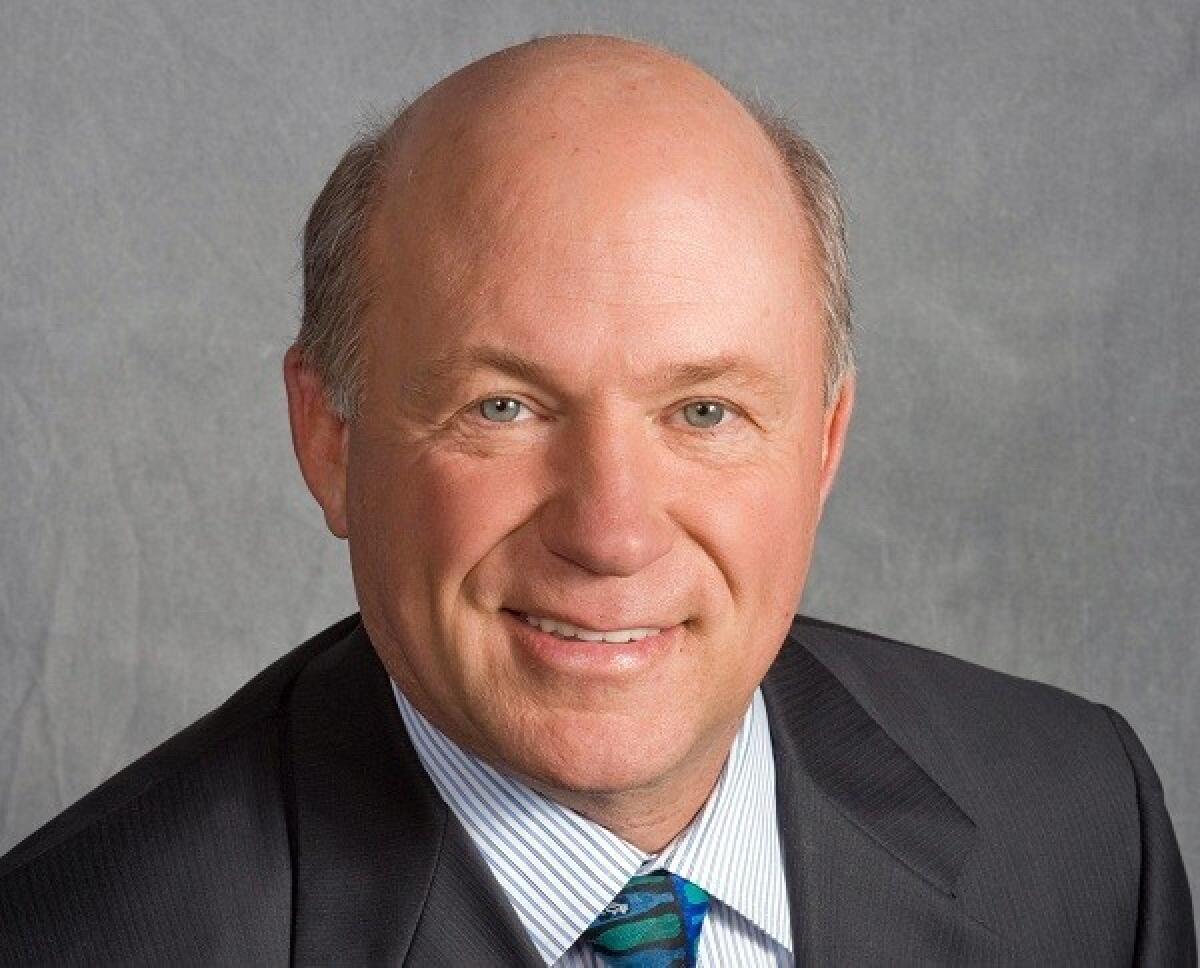Chick-fil-A president crossed a danger line

Despite decades if not centuries of bitter experience, business leaders apparently haven’t absorbed the lesson that it’s best to let your products speak for themselves and keep your big mouth shut.
The latest executive to learn this the hard way is Dan Cathy, president of the family-owned fast-food chain Chick-fil-A. In an interview with a Baptist publication and an appearance on a devotional radio program, Cathy unburdened himself of the view that gay marriage violated God’s plan.
“We are very much supportive of the family -- the biblical definition of the family unit,” he told the Biblical Recorder. On the radio, he observed: “I think we are inviting God’s judgment on our nation when we shake our fist at him and say we know better than you as to what constitutes a marriage.”
Cathy’s outburst ignited a very predictable outbreak of partisan posturing centered on the choice: ban or boycott?
The mayor of Boston, a Philadelphia council member and a Chicago alderman, among other politicians, aired threats to keep Chick-fil-A stores out of their jurisdictions, playing to their constituencies being easier since they probably have no legal right to do so, and they know it. Meanwhile, calls for boycotts erupted on Facebook, Twitter and various other places where boycotts get organized these days.
As a counterweight, Sarah Palin and Todd Palin had their picture taken holding up big bags from Chick-fil-A, as if to prove that in modern America you can affiliate yourself with retrograde social prejudice and line your arteries with cholesterol at one stop, without moving the car.
Chick-fil-A headquarters in Atlanta moved promptly to distinguish its policies from the views of its president, affirming that it hews to nondiscriminatory practices and that henceforth “our intent is to leave the policy debate over same-sex marriage to the government and political arena.”
The company’s fast footwork still leaves open the question of the right way to express distaste for a company’s politics. Municipal obstructions plainly aren’t the answer, and the mayors and council members who mentioned them were promptly slapped down by free-speech advocates, as was proper.
No one should begrudge Cathy his right to describe his personal views any way he wishes, although it might not be a terrible idea to try to learn a little more about why he thinks he has a direct line into God’s medulla oblongata before accepting his claim to be the Lord’s personal spokesman. In his radio talk, after all, he’s the one who condemned a “prideful, arrogant attitude,” though he was referring to those who have the audacity to “try to define what marriage is all about.”
Despite what Cathy’s supporters might claim, public boycotts aren’t infringements on his free speech. With a handful of modern exceptions -- the grape boycott against anti-union California growers in the 1960s and the disinvestment campaign against South African apartheid in the 1980s -- boycotts today are informational tools. No one publicizing Cathy’s views has the power or authority to keep anyone out of his stores, but they do have the ability to help patrons walking up to his counters to know where their money is going.
Still, an even more important task is to make sure that the private views of corporate bosses don’t interfere with their public obligations under the law. Should a public official pay more attention to Cathy’s ruminations or to a gender discrimination case recently filed in federal court in Georgia by a female ex-store manager? (The company hasn’t responded to the complaint in court.)
Obviously, the latter. The law provides no recourse against any corporate viewpoints, no matter how obnoxious, but it’s chock-full of protections against discrimination and other obnoxious behavior. Any mayors concerned about Chick-fil-A’s policies should welcome the company into their town, put all their eggs in the basket of laws obligating it to good public behavior and, as Andrew Carnegie and Mark Twain both said (and how often did they agree?), “Watch that basket!”
The Chick-fil-A affair is reminiscent of the last time a corporate bigwig raised a ruckus by speaking out of turn. That was in 2009, when Whole Foods founder John Mackey wrote an op-ed attacking President Obama’s healthcare proposals. Mackey hinted that we could probably do away with the need for organized healthcare by eating from the right menu, such as that marketed by his stores. He argued that the nation’s founding documents didn’t “reveal any intrinsic right to healthcare, food, or shelter” anyway, so quitcher bellyachin’. A boycott of Whole Foods was promptly launched.
In 2010, similarly, it was revealed that Target had contributed $150,000 to a PAC backing a gubernatorial candidate opposing gay rights. A customer and shareholder backlash followed.
These episodes, like the Cathy case, illustrate where the dangers lie in corporate outspokenness. First of all, it’s most damaging when actions or expressed views either run counter to a company’s marketing image or tell customers something about a firm that they had been happy to overlook before.
Nobody thinks twice, for example, about Patagonia founder Yvon Chouinard’s standing up for environmentalism and conservation; that fits right into the average Patagonia customer’s self-identification backpack. But patrons of both Whole Foods and Target tended to view both companies as paragons of social inclusiveness, which was undermined by their discovery that the former was headed by an unrepentant libertarian capitalist and the latter was lending secret support to policies that violated its own corporate standards.
As for Chick-fil-A, the piety of its owners hasn’t been exactly a secret: A 2007 profile of founder and Chief Executive S. Truett Cathy in Forbes, headlined “The Cult of Chick-fil-A,” mentioned that its corporate mission, “glorify God,” was inscribed on a plaque at company headquarters and explained that its policy of closing its 1,600 stores on Sunday aimed to allow operators to go to church and spend the time with their families. Cathy’s millions in donations to organizations opposed to gay marriage have been documented in public tax filings.
But Chick-fil-A customers didn’t have to think about that until Cathy’s son Dan stepped over the second danger line by injecting himself and his company into politics. At some point when the Cathy family was formulating its views on gay relationships, they became a political issue, what with legislatures and courts all over the country clearing the way for gay marriage and advocates of traditional marriage, whatever that is, pushing back.
Mackey and the executives of Target might have advised Dan Cathy that at that point he should clam up. No one necessarily would have begrudged Mackey his views on health and nutrition until he attached them to the question of how to provide healthcare to more Americans, which was the topic of ferocious political debate. He had as much right to air his views as anyone else, but no right to be surprised that they reflected on his company.
Similarly, Target probably thought it was in the clear on its donation to a PAC because it was secret, until it wasn’t secret anymore. Indeed, that’s why the sources of big money remain shrouded via contributions to 501(c)4 “social welfare” organizations, which don’t have to disclose their donors and yet are playing a multibillion-dollar role in state and federal elections.
Sometimes politics intercede where you may not expect it. Corporations of all types have supported Planned Parenthood for years, presumably on the grounds that helping deliver inexpensive healthcare to underprivileged women was a good thing and one that fit in with corporate principles such as diversity and fairness. Then one morning they woke up to discover that their longtime beneficiary had become transformed into a gigantic political football. (Apologies to Franz Kafka.) The next thing they knew, they were on an anti-abortion organization’s boycott list.
Corporate executives surrounded by yes men telling them how wise they are will probably continue to try sharing their wisdom on subjects well outside their core competencies. Sometimes they’ll tailor their words to what they think are their target markets. Sometimes, like Cathy, they’ll discover that there are bigger markets out there where customers may not care for what they have to say. We should defend to the death their right to speak, and also our own right to make them pay for it, or not, at the cash register.
--
Michael Hiltzik’s column appears Sundays and Wednesdays. Reach him at [email protected], read past columns at latimes.com/hiltzik, check out facebook.com/hiltzik and follow @latimeshiltzik on Twitter.
More to Read
Inside the business of entertainment
The Wide Shot brings you news, analysis and insights on everything from streaming wars to production — and what it all means for the future.
You may occasionally receive promotional content from the Los Angeles Times.











